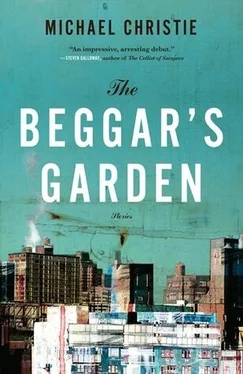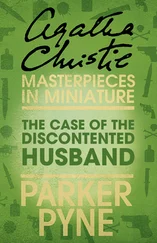He spins and grabs me by the neck of my T-shirt. His hands are weak and the cherry of his cigarette dances millimetres from my face. “I want you to listen to me very intently, you smug son of a bitch. In our minds, the Krauts could have dropped one on us at any time, understand? We never had any idea what was going to be done with it, is that clear?”
I lie and say it is.
Later, we are on the bus because Oppie wanted to “experience the authentic transport of the proletariat.” The bus seems to have cheered him up, so I ask him where he lives and he says he’s been sleeping between the stacks at the university library. I ask him how a genius can die of smoking-related throat cancer and whether he knew it was bad for him, and he tells me to stop tormenting him. I want to ask him what it’s like to be dead, but I don’t want to push it.
“Hank, I feel crack cocaine may affect you in a profoundly more negative fashion than it does me,” he says a little snidely. “I believe it has permanently altered your judgment.”
Sometimes I do worry about lasting damage, tracks laid down that can never be picked up, that sort of thing. I often try to remember what it was like to not know what the crack high feels like, and I can’t. In this way, crack rewrote my history. I remember my mother, who quit smoking cigarettes when she had me and said she dreamed of them almost every night until the day she died. Even when we ate chocolate-chip cookies in bed while watching TV, she would tap the cookie with her index finger after each bite, ashing the crumbs carefully into a little pile on her plate.
“Don’t worry about me. Just hope it doesn’t run out,” I say to Oppie, hoping it won’t run out.
A woman with a baby is sitting across from us and I wonder why the baby is up this late. Oppie plays peek-a-boo with it for a few blocks by hiding his face behind his hat. Then Oppie lights a smoke, takes a big drag, and blows it right in the baby’s face, chuckling as the woman freaks and we get kicked off the bus.
Back on the sidewalk, I notice Oppie’s smile has become strained and his face bleached. He insists on carrying all the vials himself, and he has begun to mutter. His walk has warped into an exaggerated parody of someone trying to walk with confidence. I wonder if he is a ghost and whether ghosts get the same high. I try to imagine the goings-on inside his brain. What an instrument to be flooded with so much cocaine! His mind is like a Ferrari entered in a demolition derby. He mutters something about the “allure of alkaloids” and then something about someone named Prometheus and a vulture and a rock. “You want more rock?” I say, and he nods like a little boy. I need to keep him away from people for a while.
We run out of rock shortly thereafter, and I try to convince him we should slow down. Oppie pulls out a roll of bills like the cavalry and hands the whole thing over to a man whose face I will never remember.
“Hank, I think this new batch of stones may be cut with something vile,” he says later, glancing at me suspiciously.
When I shut my eyes there is a dioramic theatre of brilliant neon, and I have resolved to keep them open so as not to lose Oppie if he starts to run. We’ve ducked into a doorway shielded from the street by a tiled staircase, and in a further effort to slow him down, I suggest maybe he should try to cook up a rock on his own for once.
“Well, that certainly contravenes the terms of our agreement, Hank, now doesn’t it? I supply the goddamn rock, you the steady hand and experimental know-how! Isn’t that it?”
He is starting to yell again, so I don’t press the issue. We smoke more and I hold the pipe. I’m saving the better hoots for myself because he doesn’t really need them, and because he is starting to annoy me. He begins kicking the bus shelter in front of us with his leather boat shoe, over and over, trying to break the glass and laughing insanely. When I tell him they are made of shatterproof glass now, he says he knows that, although he doesn’t stop.
We find ourselves back in the park that isn’t named after him and I’m beginning to think Oppie is losing his mind. Occasional forays into madness are, from what I understand, pretty standard for a genius, but this seems to be of an assortment darker and more potentially irreversible. He is mumbling in a heinous amalgamation of the many languages he seems to know. His teeth are yellowing and his fingers are blackened from gripping the charred pipe.
Aside from the playground there are a few trees and a brick structure on the perimeter of the park, but mostly it’s just a field. Oppie is rocking back and forth, staring into the park’s dark centre. I’m thinking about whether this is the highest I’ve ever been and conclude statistically it must be, but somehow I feel clear and alert. Could there be an upper limit? A cap, like terminal velocity or supersaturated solutions? I figure we need more data. I can see my room from here, and although I want to go home and read my book, and although I know there is probably already enough resin in my pipe to keep me high at least until tomorrow, I resolve to stand by him, to ride it out; that is, if it can be ridden. He needs me.
He hasn’t said anything for about an hour when my scientific thoughts are dispersed by his voice, raw from smoking and disuse. “By the mere existence of this city, would it be safe for me to assume the Cold War went all right, Hank?”
“Yeah, it went okay, Oppie.”
“Oh good,” he says, clearing his throat. “That’s good.”
Discussion
At the country-and-western karaoke bar, it’s me, Oppie, and the woman who told her boyfriend not to break my collarbone, our beer glasses hydroplaning around a small, slick table. She is wearing Oppie’s porkpie hat in the flirtatious way some women grab and wear men’s hats, perched on top of her hair like she is balancing it there, her neck stiffened, hoping the novelty of it will provoke a new appreciation of what’s beneath.
She is smoking too many of Oppie’s cigarettes, and I want to tell him she broke my collarbone and watch him rise to my defence, reducing her to tears with a bombardment of scathing quips. I decide against it. She and the beer seem to be providing Oppie with some kind of ballast, amnesty from the psychotic twister in his mind.
Earlier, after we’d left the park, Oppie scampered into a dense patch of traffic and disappeared. When I found him he was a few blocks over with this woman on his arm. This place was her idea. Oppie introduced me as Professor Hank. I scoffed when he said it, annoyed by how proud he could still make me feel.
The karaoke microphones have been monopolized by an old drunken couple who have feuded, proclaimed, wept, reconciled, and so far barely made it through a single song without one of them regressing to a bout of screaming “I fucken love you!” into the other’s face. Somebody said the guy who runs the karaoke got bottled a few hours ago and went home.
I’m in the bathroom now, hoping Oppie will be there at the table when I get back. Everything, even the ceiling, is wet. The urinal is ancient, a stainless-steel trough. I’m pissing and it sounds like a sink. This is the kind of place where the line between beer and piss is blurry and rusted out, where one seemingly unifying golden liquid soaks everything, spewing and slopping from spouts and cups.
I look at my steaming face in the dirty mirror and I come to the grim conclusion that I have to smoke more rock or go home. I consider stealing the stash and making off, but this seems too fiendish, and plus I think he could find me anywhere.
I return to the table, where his arm is around her and she is talking. “They named that piece-of-shit park after you, huh? If you ask me, sweetie, there shouldn’t be a public square inch in this neighbourhood.” Oppie is smiling and vacant. He carefully finishes his beer and rises weakly from his chair. She turns to me and asks if she has seen me before and I tell her to shut up. Oppie mounts the stage and the old couple unexpectedly surrender the microphones to him. He brings them both to his mouth at the same time and begins.
Читать дальше












